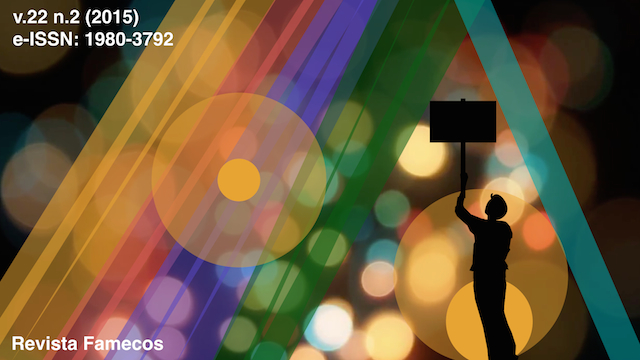e-Representação como comunicação política: Internet e democracia representativa
DOI:
https://doi.org/10.15448/1980-3729.2015.2.19717Palavras-chave:
Internet e Democracia, Internet e Representação Política, e-RepresentaçãoResumo
O objetivo deste trabalho é discutir uma teoria sobre comunicação política digital e representação democrática. Para tanto, analisa-se o lugar da representação nas teorias política e democrática, a relação entre representação e comunicação e as possíveis contribuições da Web para a prática representativa. Ao fim, sugere-se que, ao se pensar a relação entre internet e representação, a preocupação deve ser menos a de estabelecer vínculos diretos ou interatividade entre representantes e representados e mais a de promover a participação e a deliberação na representação, no ambiente online.Downloads
Referências
AGGIO, C. Internet, eleições e participação: Questões-chave acerca da participação e do ativismo nos estudos em campanhas online. In: MAIA, R. C. M.; GOMES, W.; MARQUES, F. P. J. A. (orgs.). Internet e participação política no Brasil. Porto Alegre: Sulina, p.175-195, 2011.
BERGER, P. L.; LUCKMANN, T. The Social Construction of Reality: A Treatise in the Sociology of Knowledge. Nova York: Anchor Books, 1967.
BRYANT, J.; OLIVER, M. B. (eds.). Media Effects: Advances in Theory and Research. Nova York: Routledge, 2009.
CAREY, J. Communication as Culture. Nova York: Routledge, 1989.
CASTIGLIONE, D.; WARREN, M. E. Rethinking Democratic Representation: Eight Theoretical Issues. Rethinking Democratic Representation, Centre for the Studies of Democratic Institutions, University of British Columbia, 2006.
COLEMAN, S. New Mediation and Direct Representation: reconceptualizing repre-sentation in the digital age. New Media and Society, vol.7, n.2, p. 177-198, 2005.
COLEMAN, S.; BLUMLER, J. G. The Internet and Democratic Citizenship: The-ory, Practice and Policy. Cambridge: Cambridge University Press, 2010.
CHADWICK, A.; HOWARD, P. N. The Routledge Handbook of Internet and Politics. Nova York: Routledge, 2009.
DAHLGREN, P. The Public Sphere and the Net: Structure, Space, and Communica-tion. In: BENNETT, W. L.; ENTMAN, R. M. Mediated Politics. Cambridge: Cambridge University Press, p. 33-55, 2001.
GARCÊZ, R. L. de O. Lutas por reconhecimento dos surdos e conversação política no Orkut: Quando temas sensíveis definem a trajetória das discussões. In: MAIA, R. C. M.; GOMES, W.; MARQUES, F. P. J. A. (orgs.). Internet e participação política no Brasil. Porto Alegre: Sulina, p. 231-256, 2011.
Downloads
Publicado
Como Citar
Edição
Seção
Licença
Direitos Autorais
A submissão de originais para a Revista Famecos implica na transferência, pelos autores, dos direitos de publicação. Os direitos autorais para os artigos publicados nesta revista são do autor, com direitos da revista sobre a primeira publicação. Os autores somente poderão utilizar os mesmos resultados em outras publicações indicando claramente a Revista Famecos como o meio da publicação original.
Licença Creative Commons
Exceto onde especificado diferentemente, aplicam-se à matéria publicada neste periódico os termos de uma licença Creative Commons Atribuição 4.0 Internacional, que permite o uso irrestrito, a distribuição e a reprodução em qualquer meio desde que a publicação original seja corretamente citada.






